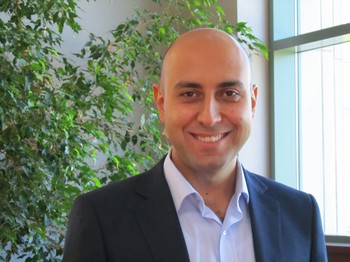Fifteen international peacemakers from different countries around the world are visiting congregations, presbyteries and colleges of the Presbyterian Church (U.S.A.) from Sept. 21-Oct. 15.
They are sharing their stories about church-based ministries in their countries that seek peace justice and pursue peace in the name of Jesus Christ. This year’s international peacemakers come from Colombia, Honduras, Indonesia, Jordan, Lebanon, Madagascar, Northern Ireland, Palestine, the Philippines, Russia and Syria.
The International Peacemaker program is sponsored by the Presbyterian Peacemaking Program.
Majd Lahham, a member of the Greek Orthodox Church in Damascus, Syria, works with International Orthodox Christian Charities on a program for Iraqi refugees providing education, vocational training, community service projects, relief items, and psychosocial support. With the outbreak of conflict in his country, Lahham’s work has increasingly included relief for displaced Syrian civilians.
Majd will be visiting the Presbyteries of Chicago, Mackinac, the James and Palisades. He will also visit Mary Baldwin College in Staunton, Va.
What is the situation in your country that you will be addressing?
“I was invited to speak about our work for Iraqi refugees ― our humanitarian and development programs. That was before the Syrian crisis, so now I will also be speaking about our relief program for displaced Syrians. I will also speak about the Christian presence in the Middle East.”
How are the faith communities addressing this situation?
“The Good Samaritan is our motto ― that’s why the Greek Orthodox Patriarchate is involed with helping all people, in partnership with the World Council of Churches, the ACT Alliance the PC(USA), the Middle East Council of Churches and International Orthodox Christian Charities. We coordinate with various government ministries and receive much support from the U.S. There are seven Christian denominations in Damascus ― we work with them all.”
What lessons from your situation are you trying to communicate to U.S. Presbyterians?
“War cannot solve anything and will lead us nowhere. We have lost many beautiful people. We have a large staff but the key to our ministry is volunteers. Meeting physical needs is important, but as Christians we must also bring compassion and hope. Food for one’s stomach and a blanket for one’s body are important ― but so is a smile on one’s face.”
What is the primary message you want to communicate to U.S. Presbyterians?
“From the beginning Christians have been part of this community. We believe in dialogue. Any solution must respect all minorities.”

